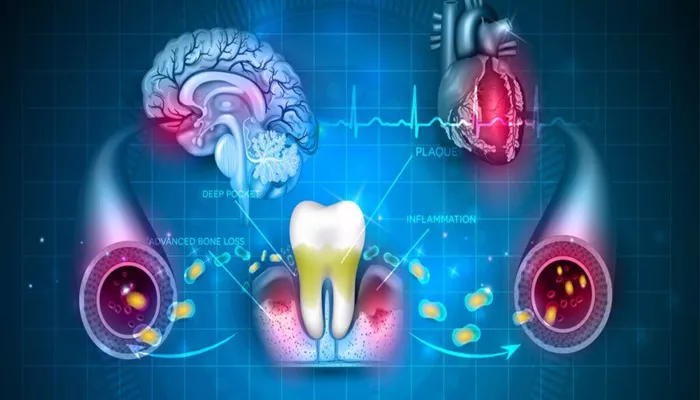Periodontal disease, commonly known as gum disease, is an infection of the tissues that surround and support the teeth. It is a prevalent condition that affects millions of people worldwide. While many view periodontal disease as a localized issue affecting only the gums and teeth, research shows that it can have significant effects on overall health. This article will explore how periodontal disease impacts various systems in the body, the connections to chronic diseases, and the importance of maintaining good oral health.
Causes of Periodontal Disease
The primary cause of periodontal disease is the accumulation of plaque, a sticky film of bacteria that forms on the teeth.
Other contributing factors include:
Poor Oral Hygiene: Inadequate brushing and flossing allow plaque to build up and harden into tartar.
Smoking: Tobacco use weakens the immune response and makes it harder for the body to fight infections.
Hormonal Changes: Fluctuations in hormones can make gums more sensitive and susceptible to disease.
Certain Medications: Some drugs can reduce saliva flow or cause gum overgrowth, increasing the risk of periodontal disease.
Genetics: A family history of gum disease can increase an individual’s risk.
Chronic Diseases: Conditions such as diabetes can exacerbate periodontal disease.
The Link Between Periodontal Disease And Overall Health
1. Cardiovascular Health
Research has shown a strong connection between periodontal disease and cardiovascular health. The inflammation caused by gum disease can lead to the following:
Increased Risk of Heart Disease: The bacteria from periodontal disease can enter the bloodstream and contribute to the formation of arterial plaque. This plaque buildup can narrow blood vessels and increase the risk of heart attacks and strokes.
Inflammation: Chronic inflammation from periodontal disease can elevate levels of C-reactive protein (CRP), a marker associated with heart disease.
2. Diabetes Management
Diabetes and periodontal disease have a bidirectional relationship.
This means that each condition can worsen the other:
Increased Risk of Periodontal Disease: People with diabetes are more susceptible to infections, including gum disease.
High blood sugar levels can impair the body’s ability to fight off bacteria.
Worsening Blood Sugar Control: Periodontal disease can make it more difficult for diabetics to control their blood sugar levels. The inflammation associated with gum disease can interfere with insulin function, leading to higher blood sugar levels.
SEE ALSO: How to Shrink Gum Pockets Naturally?
3. Respiratory Health
Periodontal disease can also impact respiratory health. The bacteria from infected gums can be inhaled into the lungs, leading to respiratory infections. This can be particularly concerning for individuals with pre-existing lung conditions, such as:
Chronic Obstructive Pulmonary Disease (COPD): Studies have shown that individuals with periodontal disease may experience more severe symptoms of COPD.
Pneumonia: Bacteria from the mouth can enter the lungs and cause pneumonia, especially in older adults or those with weakened immune systems.
4. Pregnancy Complications
Periodontal disease can have serious implications for pregnant women. Research indicates that women with gum disease are at a higher risk for:
Preterm Birth: Inflammation and infection from periodontal disease can lead to premature labor.
Low Birth Weight: Babies born to mothers with untreated periodontal disease may have lower birth weights, which can lead to health complications.
5. Cognitive Health
Emerging research suggests a link between periodontal disease and cognitive decline. Chronic inflammation from gum disease may contribute to:
Alzheimer’s Disease: Some studies have found that individuals with periodontal disease may have an increased risk of developing Alzheimer’s disease. The inflammatory response may play a role in the progression of neurodegenerative diseases.
Memory Loss: Inflammation in the body can affect brain function and memory, leading to cognitive decline.
6. Cancer Risk
There is evidence to suggest that periodontal disease may be associated with an increased risk of certain types of cancer, particularly:
Head and Neck Cancers: Chronic inflammation and infection in the oral cavity can contribute to the development of cancers in the head and neck region.
Pancreatic Cancer: Some studies have indicated a potential link between periodontal disease and an increased risk of pancreatic cancer, although more research is needed in this area.
The Importance of Oral Health
Given the significant impact of periodontal disease on overall health, maintaining good oral hygiene is crucial. Here are some essential practices to promote oral health:
1. Regular Dental Check-Ups
Regular visits to the dentist are vital for preventing and detecting periodontal disease early. Dentists can perform professional cleanings to remove plaque and tartar buildup and assess gum health.
2. Good Oral Hygiene Practices
Brush Twice Daily: Use fluoride toothpaste and a soft-bristled toothbrush to brush your teeth for at least two minutes, twice a day.
Floss Daily: Flossing helps remove plaque and food particles from between the teeth and along the gum line, where a toothbrush may not reach.
Use Mouthwash: An antimicrobial mouthwash can help reduce plaque and gingivitis.
3. Healthy Lifestyle Choices
Quit Smoking: If you smoke, seek help to quit. This can significantly improve your oral and overall health.
Eat a Balanced Diet: A diet rich in fruits, vegetables, whole grains, and lean proteins can support gum health. Limit sugary snacks and beverages that can contribute to plaque buildup.
Conclusion
Periodontal disease is not just a localized oral health issue; it can have far-reaching effects on overall health. The connections between gum disease and conditions such as heart disease, diabetes, respiratory health, pregnancy complications, cognitive decline, and cancer highlight the importance of maintaining good oral hygiene.
By understanding how periodontal disease affects overall health, individuals can take proactive steps to protect their gums and teeth. Regular dental check-ups, good oral hygiene practices, and healthy lifestyle choices are essential for preventing periodontal disease and promoting overall well-being. Prioritizing oral health is a vital part of maintaining a healthy body and a vibrant life.

